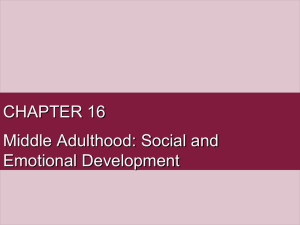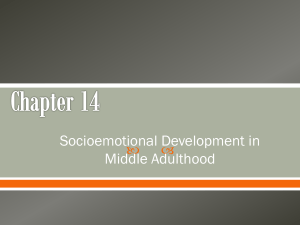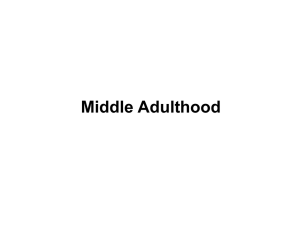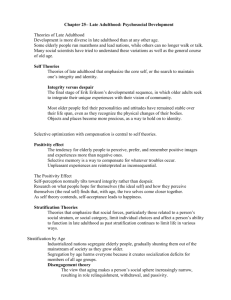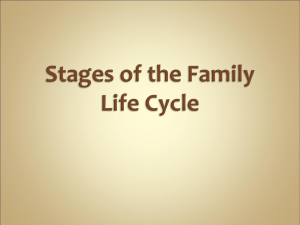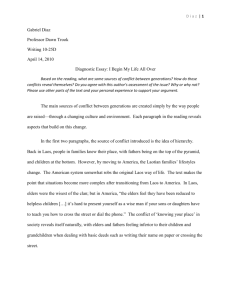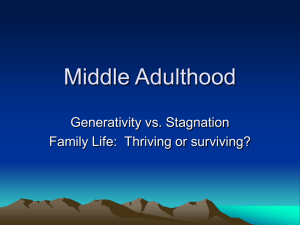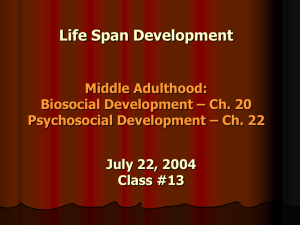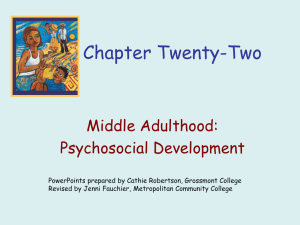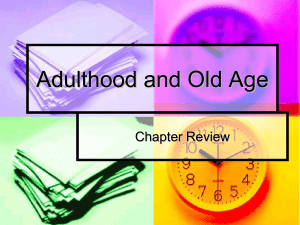chapter 16 updated 2011
advertisement
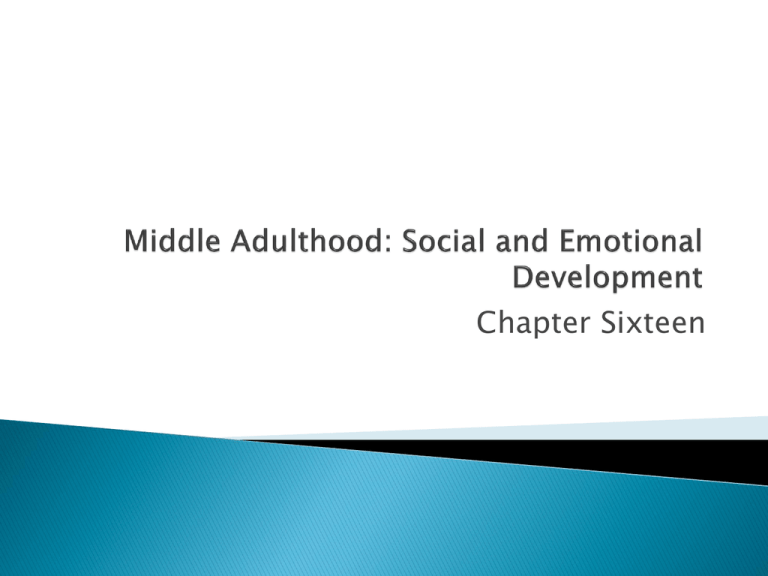
Chapter Sixteen Believed major psychological challenge of the middle years is generativity versus stagnation Generativity — ability to generate or produce; based on instinctual drive toward procreativity (bearing and rearing children) Stagnation — rejection of generativity drive can result in a life stripped of meaning and purpose Generativity can consist of parenting one’s own children, helping others with their children, being engaged in projects that will influence future generations Midlife transition — the years from 40 to 45; psychological shift into middle adulthood often accompanied by a crisis during which people fear they have more to look back upon than forward to Midlife crisis — time of dramatic self-doubt and anxiety during which people sense the passing of their youth and become preoccupied with concern about the imminence of their own mortality; may be imposed from external factors such as work downsizing, menopause, your child leaving the nest, or death of a parent or friend Midlife usually identified around age 35 for women and age 40 for men; women reach it about five years earlier mostly due to reproductive awareness Due to unrealized dreams, life losses psychotherapy during this time should not be overlooked Midlife can be prime of life if the person has continued to develop in their area of expertise or interest; there is little loss of intelligence Middle-aged adults, especially professionals, are often earning more money than young adults; tend to be geographically and vocationally settled; most have built systems of social support and my be involved in endearing romantic and social relationships as well as have children Flip side of middle adulthood is overwhelming responsibility of taking care of your own family, helping with your aging parents and remaining in the workplace all at once Life-events approach focuses on the particular challenges that are likely to face people at this time of life rather than focus on phases or stages Stressful life events in middle adulthood may consist of: death of a spouse, child, parent or sibling; changes in health; caring for one’s parents; financial difficulties; concern about one’s appearance, weight or aging; moving; change in employment; changes in relationships; changes in responsibilities at work Many middle-aged women do not experience “empty nest syndrome” and take advantage of their new time by being in the workplace and finding life satisfaction in other activities besides childrearing and homemaking Supportive social network, positive attitude and a sense of control help to mitigate the effects of stress Personalities tend to mature rather than be shaped by environmental conditions, expression of personality traits is influenced by culture The “big five” personality traits tend to show stability over time Some trends of group personality changes over the years, but introverted tend to remain introverted, extroverted tend to remain extroverted Neuroticism declines over time; agreeableness and conscientiousness increase over time; extraversion and openness to new experience declines slightly over time Parents are stressed when adolescents do not exerts self-control and have to direct them in multiple areas of their life Children who are young adults may still be financially reliant upon their parents; some still live at home; parents balance between staying in touch with the young adult and interfering with their life choices Living at home as a young adult differs according to culture as well as location Married children present new family members (in-laws) who may or may not enrich their parents’ lives Grandparents have to balance interfering with possibly neglecting their grandchildren Having grandchildren is viewed as a positive life event Grandparents spend a higher proportion of their time with their grandchildren in recreational and educational activities Grandchildren tend to spend more time with their grandmothers than with their grandfathers all the way through adolescence Grandchildren tend to be more involved with maternal grandparents than paternal grandparents Grandparents tend to have resources such as trips available for grandchildren, but parents do the caretaking Grandparents have less influence on their grandchildren when they live with them; conflict between adult children and grandparents ensue over parenting Some grandparents end up the custodial parent to their grandchildren; changes the lifestyle of the middle adult and places emotional challenges as well as balancing issues Most elderly parents live near one of their middle-aged children Most burden of taking care of the elderly parents falls on the middle-aged daughter Sandwich generation refers to middle-aged daughter taking care of her own children and/or grandchildren as well as her ageing parents Middle-aged female may also be working causing more stress; if lucky she will have a sibling living near by to help out There are cultural differences in who, how and where elderly parents live and reside Most people in middle adulthood have at least one living sibling Nature of sibling relationships reflect the childhood relationship Some sibling relationships get better as they take care of ageing parents together On the other hand, sibling relationship may suffer if only one of the siblings is taking care of the elderly parent Adults in middle adulthood tend to have a lower number of friends Middle-aged adults place value on the friends they do have Their friends tend to mirror them in interests, activities and years of mutual experiences Male friends tend to be more competitive and less likely to be intimate than female friends Loss of a friend is felt very deeply
